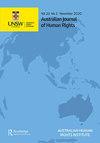Travelling with Durbach: notes from a trip to South Africa researching reparations for victims of sexual violence
Q1 Arts and Humanities
引用次数: 0
Abstract
ABSTRACT In January 2015, I had the privilege of accompanying Professor Andrea Durbach to conduct fieldwork in South Africa for a major Australian Research Council-funded project ‘Combating sexual violence against women post-conflict through “transformative” reparations: problems and prospects’. In this short autoethnographic paper, I offer a series of reflections on this formative fieldwork experience—the first time I had participated in the design of qualitative interviews for the purposes of academic research—and witnessed the careful way Durbach approached this trip. Throughout the piece, I interweave personal notes, correspondence and other literature, which anchor me to this place and experience. In doing so, I seek to explore the tensions of designing fieldwork when, as researchers, we cannot escape ourselves: our positionality necessarily informs both the substance and mode of any academic inquiry. During our time together in South Africa, I observed how Durbach negotiated issues of identity, access and positionality; the impact these complexities had on oft-times blurred relationships between interviewer and interlocutor; and the ways in which interrogating these questions can assist researchers to (re)produce knowledge on questions of violence in sensitive, collaborative and innovative ways.与德巴赫一起旅行:去南非研究性暴力受害者赔偿的笔记
2015年1月,我有幸陪同Andrea Durbach教授在南非进行了一项由澳大利亚研究委员会资助的重大项目“通过“变革性”赔偿打击冲突后对妇女的性暴力:问题与前景”的实地调查。在这篇简短的自我民族志论文中,我对这次形成性的实地考察经历进行了一系列反思——这是我第一次参与为学术研究目的而设计的定性访谈——并见证了德巴赫对待这次旅行的谨慎方式。在整个作品中,我将个人笔记、信件和其他文学作品交织在一起,将我锚定在这个地方和经历中。在这样做的过程中,我试图探索设计实地考察的紧张关系,作为研究人员,我们无法逃避自己:我们的立场必然会告知任何学术探究的实质和模式。在我们一起在南非的那段时间里,我观察到德巴赫是如何协商身份、准入和地位等问题的;这些复杂性对面试官和对话者之间往往模糊不清的关系产生了影响;询问这些问题的方式可以帮助研究人员以敏感、协作和创新的方式(重新)产生关于暴力问题的知识。
本文章由计算机程序翻译,如有差异,请以英文原文为准。
求助全文
约1分钟内获得全文
求助全文
来源期刊

Australian Journal of Human Rights
Arts and Humanities-History
CiteScore
1.30
自引率
0.00%
发文量
43
期刊介绍:
The Australian Journal of Human Rights (AJHR) is Australia’s first peer reviewed journal devoted exclusively to human rights development in Australia, the Asia-Pacific region and internationally. The journal aims to raise awareness of human rights issues in Australia and the Asia-Pacific region by providing a forum for scholarship and discussion. The AJHR examines legal aspects of human rights, along with associated philosophical, historical, economic and political considerations, across a range of issues, including aboriginal ownership of land, racial discrimination and vilification, human rights in the criminal justice system, children’s rights, homelessness, immigration, asylum and detention, corporate accountability, disability standards and free speech.
 求助内容:
求助内容: 应助结果提醒方式:
应助结果提醒方式:


